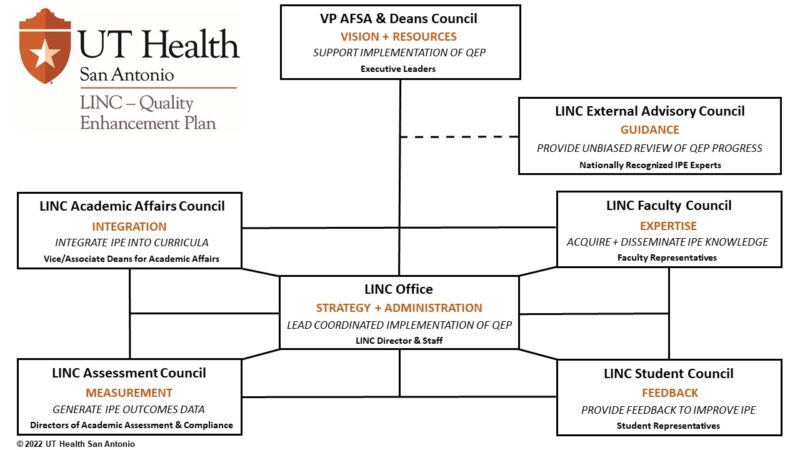LINC Organizational Model

Structure of LINC
Achieving the goals of our Quality Enhancement Plan (QEP) would be impossible without the engagement and cooperation of key contributors from across campus. Our progress to date is the result of over 70 colleagues working in interconnected, interprofessional Councils. Each Council identifies and pursues goals, charges, or projects in cooperation with other Councils.
UT Health San Antonio’s Vice President for Academic, Faculty & Student Affairs (VP AFSA) and Deans Council provide the vision and support for success. A team of nationally and internationally recognized experts constitute our LINC External Advisory Council, which provides perspective, insights, and guidance through periodic reviews of progress.
The LINC Office establishes strategy, coordinates information exchange, aligns efforts, and provides support across the 4 primary Councils listed below that collectively represent the nucleus of our IPE incubator, and also leads the following IPE program that is central to the QEP’s success: LINC Simulation IPE Experience.
(1) LINC Faculty Council: One faculty representative from each school, and teams of faculty and staff they lead, who acquire and disseminate knowledge about IPE, develop IPE programming, and pursue collaborative scholarship.
-
-
- LINC Didactic IPE Initiative: Dedicated to understanding and advancing IPE activities that take place in classroom settings, including online, as part of formal curricula (e.g., credit-bearing coursework), whose signature program is the LINC Common IPE Experience.
- LINC Clinical IPE Initiative: Dedicated to understanding and advancing IPE activities that take place in clinical settings as part of formal curricula (e.g., credit-bearing coursework), whose signature program is under development and scheduled to launch in 2023.
- LINC Co-Curricular IPE Initiative: Dedicated to understanding and advancing IPE activities that take place outside of formal curricula (e.g., volunteer experiences that augment learning/professional development), whose signature program is the LINC Interprofessional Case Competition.
- LINC Faculty & Staff Development Initiative: Dedicated to improving IPE knowledge and skills of faculty and staff in order to enhance training for students that leads to improved healthcare outcomes, whose signature programs are the LINC Faculty & Staff Development Program and LINC Seed Grant Program.
- LINC Clinical Research Initiative: Dedicated to developing and studying the impact of IPE- and interprofessional collaborative practice-based interventions on Quintuple Aim outcomes, whose signature program is under development and scheduled to launch in late 2024/early 2025.
-
(2) LINC Academic Affairs Council: Vice and associate deans for academic affairs and/or curriculum from each school who integrate IPE into curricula and contribute to the QEP via the development and systematic study of program-specific IPE Plans, and the generation of an Annual Workplan & Priorities publication to guide LINC’s efforts.
(3) LINC Assessment Council: Directors of academic assessment and compliance from each school and experts in quantitative and qualitative analyses who generate, analyze, and report university-wide IPE outcomes data and contribute to the QEP via administration of the LINC Core IPE Measurement Plan.
(4) LINC Student Council: Student representatives from each school and a multitude of educational programs who provide insight and feedback to improve the quality of IPE programming and contribute to the QEP via the development and implementation of student-led IPE opportunities, such as the university-wide LINC IPE Symposium and LINC Interprofessional Student Social Series.
